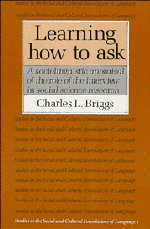 Learning How to Ask
Learning How to Ask Book contents
- Frontmatter
- Contents
- Foreword by Aaron V. Cicourel
- Preface
- 1 Introduction
- 2 The setting: Mexicano society and Córdova, New Mexico
- 3 Interview techniques vis-à-vis native metacommunicative repertoires; or, on the analysis of communicative blunders
- 4 The acquisition of metacommunicative competence
- 5 Listen before you leap: toward methodological sophistication
- 6 Conclusion: theoretical quagmires and “purely methodological” issues
- Notes
- References
- Index
1 - Introduction
Published online by Cambridge University Press: 05 June 2012
- Frontmatter
- Contents
- Foreword by Aaron V. Cicourel
- Preface
- 1 Introduction
- 2 The setting: Mexicano society and Córdova, New Mexico
- 3 Interview techniques vis-à-vis native metacommunicative repertoires; or, on the analysis of communicative blunders
- 4 The acquisition of metacommunicative competence
- 5 Listen before you leap: toward methodological sophistication
- 6 Conclusion: theoretical quagmires and “purely methodological” issues
- Notes
- References
- Index
Summary
Interviewing has become a powerful force in modern society. Starting almost from birth, we are confronted by questions posed by educators, psychologists, pollsters, medical practitioners, and employers, and we listen to flamboyant interviewers on radio and television. Our skill at playing the role of interviewee influences our success in education and employment; our answers will help determine whether we receive such basic services as bank loans or disability pay. On a societal level, polling “pundits” are no longer employed exclusively by such specialized agencies as the National Opinion Research Center in Chicago or the Gallup Poll. Major corporations spend millions of dollars on market surveys that estimate customer wants and resources. Pollsters form integral members of major political campaigns, and their findings have a profound effect on the way candidates approach the voters. “Exit polls” now enable the media to advise West Coast residents as to how the East Coast has voted in national elections – even before the polls have closed.
Research in the social sciences is the great bastion of the interview. Estimates suggest that 90 percent of all social science investigations use interview data (cf. Brenner 1981b: 115). Interviews are used in a wide variety of social contexts. A central component of the anthropological tool kit, interviews have produced a good bit of the information we possess about contemporary non-Western societies. Interviewing is, however, also a mainstay of research within modern industrial societies.
- Type
- Chapter
- Information
- Learning How to AskA Sociolinguistic Appraisal of the Role of the Interview in Social Science Research, pp. 1 - 30Publisher: Cambridge University PressPrint publication year: 1986
